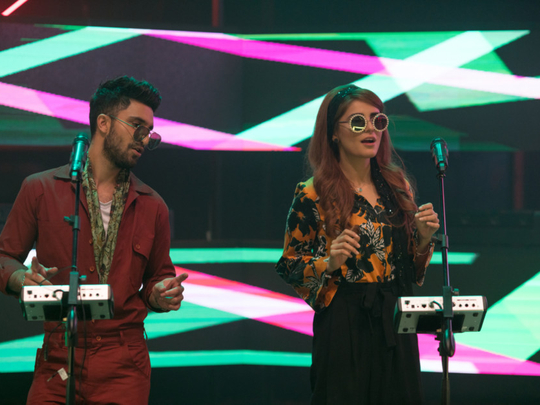
Pakistan’s Coke Studio has had its share of praise as well as criticism. But now the show, in its 11th season, is facing never-before-seen uproar over the cover of an iconic Pakistani song.
Singers Momina Mustehsan and Ahad Raza Mir’s version Ko Ko Korina, hailed as Pakistan’s first genuine pop song, has been slammed for jarring, ‘anglicised’ notes added in the name of contemporarising the oldie.
The song was originally sung by the late Ahmad Rushdi for the blockbuster movie Armaan in 1966.
Social media erupted with rage after the release of the cover.
“These kind of debacles will keep on happening in the entertainment industry of Pakistan, because of nepotism,” tweeted Zakariya Shah.
“136k Dislikes and counting more,” wrote @thePakistaniiii.
Some of the posts and memes were even harsher.
@Pindiwala3 complained of being “mentally tortured by listening Ko Ko Korina.”
Another posted a photo of a young girl with a bleeding ear; it said: “After listening to #kokokorina.”
It all began when Shireen Mazari, Pakistan’s minister for human rights, took to Twitter and called the song “horrendous” and a “massacre.”
Mustehsan replied: “In a time when we’re trying to curb cyber-bullying and hate speech, please don’t fuel it further. #SocialResponsibility.”
Mir was the last to enter the conversation. The award-winning actor tweeted: “I am honoured that I got to cover Ko Ko Korina. Some people enjoyed it and some not so much, which is fair. Look at how we love to appreciate and criticise. It shows our nation is alive. Even after hearing the song. Pun intended.”
His comments fairly sum up the situation. Covers are a norm in the music industry all over the world.
History shows how Elvis Presley’s version of Carl Perkins’s Blue Suede Shoes got the King of Rock and Roll more appreciation than the original. Whitney Houston covered Dolly Parton’s I Will Always Love You and George Benson’s The Greatest Love of All, and won hearts.
Closer to home, Lata Mangeshkar reprised the all-time greats of Hemant Kumar, Kishore Kumar and others, in her tribute collection, titled Shradhanjali. In Pakistan, we have had countless covers of maestros such as the late Madam Noor Jehan, Ustad Nusrat Fateh Ali Khan, Mehdi Hassan, and Iqbal Bano.
For underground bands, covers are a routine at any gig. As noted cultural critic Sarwat Ali puts it: “The idea is not to stop anyone, or tell them who is — and who isn’t — qualified to do covers. Everyone is free to practise art. You should only judge their work purely on merit.”
“Coke Studio thrives on covers,” says Farrukh Bashir, former music producer at PTV, the country’s national television. “They are a commercial venture, and I’m afraid they often end up reducing a classic to a club song.”
“I’m not against contemporarising [the old songs],” he tells Gulf News tabloid!. “My only worry is that not everyone can pull off an Ahmad Rushdi cover.”









